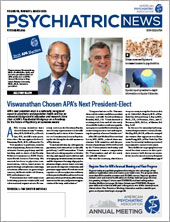Successfully launched at last year’s Annual Meeting in New Orleans, this year’s Clinical Updates Track is designed to address some of the most vexing clinical challenges in the day-to-day practice pf psychiatry. The speakers include many leading experts, known for both expertise and teaching skills.
I remember my first APA Annual Meeting (more years ago than I care to remember)—it was also in San Francisco. The enormity of it all was both thrilling and a bit intimidating. Registration complete, I lugged the complimentary blue APA bag back to my hotel. I dropped it onto my bed, and out spilled a cornucopia of catalogues, brochures, and event announcements. The joy of abundance succumbed to the dismay of bewildering choice.
Choosing which session to attend among the hundreds offered can be perplexing. For those members who want to be confident that a particular presentation is going to be primarily oriented toward real-world clinical application, the Clinical Updates Track offers a guiding hand.
Stephen Stahl, M.D., Ph.D., Charles Nemeroff, M.D., Ph.D., Roger McIntyre, M.D., and Wayne Goodman, M.D., are among the 30 internationally distinguished speakers who will present state-of-the-art best-practice reviews of clinical approaches to common clinical challenges.
Among the highlights:
•
MAO inhibitors: The oldest of antidepressant categories, MAO inhibitors are still among the most effective medications we have, yet a legacy of anxiety about their use (arguably undeserved) leaves them grossly underutilized. As a result, many of our colleagues have had minimal experience and training in the use of these medications, further perpetuating avoidance of a drug category that provides therapeutic benefits that some patients find with no other medications. Dr. Stahl will review the indications and use of these medications.
•
Posttraumatic stress disorder (PTSD): Addressing the needs of patients with PTSD demands that we attend to the evolving clinical science so that we can make informed treatment recommendations. What are the different forms of trauma-informed psychotherapy? What approach is best for your patient? What do medications have to offer for individuals with PTSD? How do we address sleep disorders among these patients? Dr. Nemeroff will discuss the state-of-the-art clinical treatment of PTSD.
•
Treatment-resistant depression (TRD): TRD is probably one of the most common prompts for asking “What do I do now?” Dr. McIntyre will lead participants through an algorithmic approach about treatment of your patients with TRD.
•
Benzodiazepines: We know that there are many patients on benzodiazepines who should probably be tapered off. And we also know that there are times when these medications are highly appropriate, even if only for a brief duration. The role of benzodiazepines in our pharmacologic toolkit has been emerging as a polarizing issue in our field. Prescribe? De-prescribe? Who? When? How? A panel of four experts will consider the pros and cons of benzodiazepines and discuss the appropriateness of their use in different clinical scenarios and techniques for de-prescription when appropriate.
•
Obsessive-compulsive disorder (OCD): Treating OCD can be a major challenge. We’re understandably thrilled when a patient reports an excellent response to either initial medication or psychotherapeutic interventions because outcomes of initial interventions are often insufficient or disappointing. Dr. Goodman will review treatment options for those who must go to another step.
All the presentations in the Clinical Updates Track are designed to provide insight and information that will be practical and ready for implementation as soon as you get back to your office or clinic. ■

